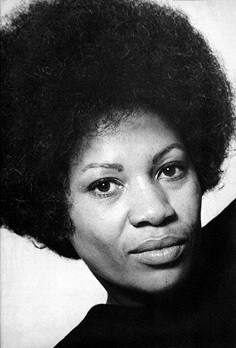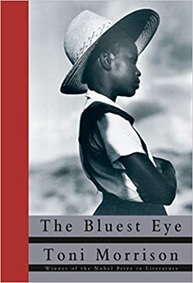Born: February 18, 1931
Died: August 5, 2019
Ohio connection: Birth
Lorain
Toni Morrison, hailed as a “literary artist of the first rank” by the Swedish Academy when she was awarded the Nobel Prize for Literature in 1993, was born Chloe Anthony Wofford in the small, industrial town of Lorain, Ohio, on February 18, 1931. Raised by nurturing, hard-working, story-telling parents, steeped in the oral traditions of their ancestors, Morrison developed a love of reading. Upon entering the first grade she was the only black student and the only student that knew how to read. She graduated with honors from Lorain High School in 1949. In 1953 Morrison graduated from Howard University, with a B. A. in English and classics minor. She then earned an M. A. in English at Cornell University, thus completing her formal education in 1955. In 1958, she married Harold Morrison, a Jamaican architect; the couple had two sons. They divorced in 1964.
Morrison taught English at Texas Southern University (1955-1957) and Howard University (1957-1963). While teaching at Howard University, Morrison joined a faculty writers group; it was there she began to write seriously. Morrison moved to New York in 1964 to work as senior editor at Random House. In 1965 Morrison was hired as senior editor with textbook publisher L.W. Singer (a subsidiary of Random House) in Syracuse, New York.
Morrison turned a story she wrote for a writers group into her first novel, The Bluest Eye, which, after several rejections, was published in 1970. Thirty years after publication, in April 2000, the novel was chosen for Oprah’s Book Club, a testament to the power of a story about a little black girl who longs to be beautiful and have blue eyes. Morrison’s next novel, Sula, about a woman who chooses to live an “experimental life” rather than conform to societal standards, was published in 1973. It won the Ohioana Book Award and was nominated for the National Book Award in 1975. National acclaim and commercial success followed publication of Song of Solomon (1977). The novel won a National Book Critics Circle Award for fiction in 1978 and became a paperback bestseller. Tar Baby, an adaptation of the African-American folktale of Tar Baby and Brer Rabbit, was published in 1981. The book made The New York Times bestseller list and earned Morrison the March 30, 1981, cover of Newsweek magazine.
In 1983, after nearly nineteen years at Random House, Morrison resigned to become a full-time writer. In 1984 she returned to teaching as the Albert Schweitzer Professor of the Humanities, College of the Humanities and Fine Arts at the State University of New York, Albany. In 1987, Morrison was named the Robert F. Goheen Professor in the Council of Humanities at Princeton University; that same year she published her most controversial novel, Beloved, which tells the story of “Sethe,” an escaped slave who would rather kill her children than see them recaptured and returned to the plantation and a life of slavery. Beloved became a bestseller and won Morrison a Pulitzer Prize for fiction in 1988. She explored the tumultuous relationship of a couple from Virginia who live in New York during the Harlem Renaissance for her next novel, Jazz, published in 1992. Morrison received international recognition for her writing in 1993 when she was awarded the Nobel Prize for Literature, becoming the eighth woman, the first black woman and the first native-born American author since 1962 winner John Steinbeck to win the prestigious award. Morrison continued to teach at Princeton and author works of fiction and nonfiction (see Morrison’s bibliography) until her retirement in 2006. After her retirement, Morrison published three novels, A Mercy in 2008; Home in 2012 and God Help the Child in 2015. Her final work, Source of Self Regard, collection of lectures and essays, was published in February 2019. Toni Morrison was awarded nearly every prestigious award a writer could be honored she leaves an incomparable legacy.
Toni Morrison died from complications of pneumonia on August 5, 2019.
Awards
National Book Award nomination and Ohioana Book Award, both 1975, both for Sula; National Book Critics Circle Award and American Academy and Institute of Arts and Letters Award, both 1977, both for Song of Solomon; New York State Governor’s Art Award, 1986; National Book Award nomination and National Book Critics Circle Award nomination, both 1987; the Anisfield-Wolf Book Award, the Pulitzer Prize for fiction, the Robert F. Kennedy Award, and the American Book Award (Before Columbus Foundation), all in 1988 for Beloved; Elizabeth Cady Stanton Award, National Organization for Women; Nobel Prize in Literature, 1993; Pearl Buck Award, Rhegium Julii prize, and Condorcet medal (Paris, France), all 1994; National Book Foundation Medal for Distinguished Contribution to American Letters, 1996; National Humanities Medal, 2001; subject of Biennial Toni Morrison Society conference in Lorain, OH; Honorary Doctorate of Letters from Oxford University (2005); New Jersey Hall of Fame inductee (2008); Norman Mailer Prize, Lifetime Achievement (2009); Library of Congress Creative Achievement Award for Fiction (2011); Presidential Medal of Freedom (2012); The Nichols-Chancellor’s Medal awarded by Vanderbilt University (2013); 2014 Ivan Sandrof Lifetime Achievement Award given by the National Book Critics Circle (2014); 2016 PEN/Saul Bellow Award for Achievement in American Fiction
Additional Resources
Wikipedia: Toni Morrison




